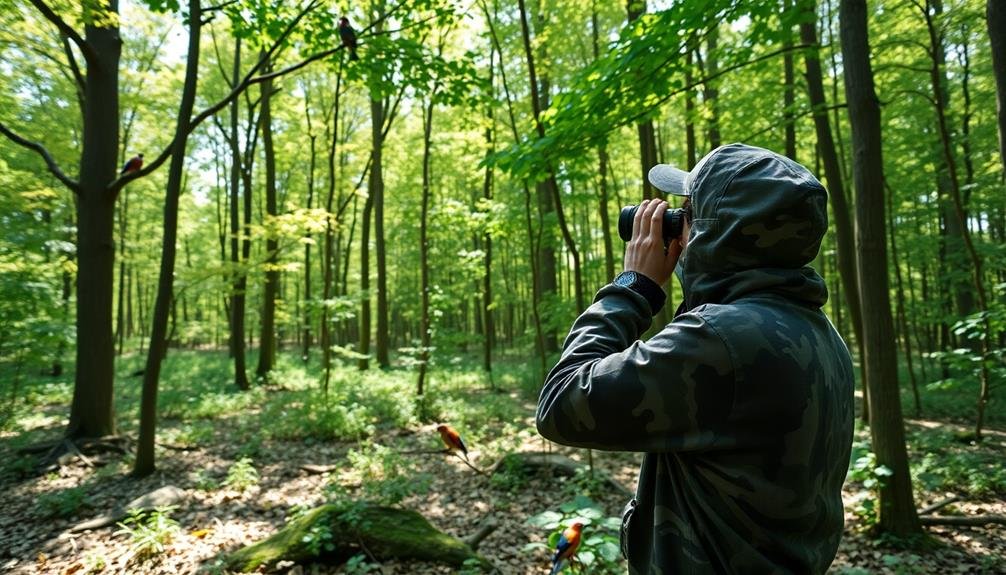Birdwatching offers a powerful antidote to anxiety through its unique blend of mindfulness and nature connection. You'll engage in gentle sensory stimulation as you focus on birds' colors, movements, and songs. This slow-paced outdoor activity encourages you to be present, observing without judgment. You'll boost your self-esteem by identifying species and potentially connect with like-minded enthusiasts. The hobby provides structure and routine while allowing for quiet reflection and escape from digital overload. As you develop your skills, you'll experience a sense of accomplishment and deepen your connection with wildlife. Discover how this calming pursuit can transform your mental well-being.
Mindfulness in Nature

Three key elements of mindfulness converge in nature: awareness, presence, and non-judgment. When you're birdwatching, you're naturally drawn into a state of heightened awareness. You're constantly scanning your surroundings, listening for chirps and calls, and observing the smallest movements. This focused attention anchors you firmly in the present moment, pulling your mind away from anxious thoughts about the past or future.
Nature provides a non-judgmental environment where you can simply observe without the pressure to perform or achieve. As you watch birds, you're not trying to change or control them; you're simply witnessing their behaviors and admiring their beauty. This practice of non-judgmental observation can extend to your own thoughts and feelings, helping you develop a more accepting attitude towards your anxiety.
Birdwatching also encourages slow, deliberate movements and controlled breathing, which are key components of mindfulness practices. The act of quietly moving through nature, pausing to observe, and taking deep breaths to steady your binoculars all contribute to a meditative state that can considerably reduce anxiety levels.
Gentle Sensory Stimulation
While engaging in birdwatching, you're exposed to a gentle array of sensory stimuli that can help soothe anxiety. The soft chirping and melodious songs of birds provide a calming auditory experience, contrasting with the often harsh and jarring sounds of urban life. These natural sounds can lower stress levels and promote relaxation.
Visually, you're treated to a subtle yet enchanting display of colors, shapes, and movements. The delicate hues of feathers, the graceful flight patterns, and the intricate behaviors of birds offer a focus point that's engaging without being overwhelming. This visual stimulation can help distract your mind from anxious thoughts.
The act of birdwatching also engages your sense of touch in a mild way. You'll feel the texture of binoculars in your hands, the gentle breeze on your skin, or the sensation of grass beneath you if you're seated. These tactile experiences ground you in the present moment.
Even your sense of smell is gently awakened by the fresh outdoor air, which can have a revitalizing effect on your mood and mental state.
Slow-Paced Outdoor Activity

Birdwatching offers a rejuvenating alternative to high-intensity outdoor activities that can sometimes exacerbate anxiety. As you engage in this leisurely pursuit, you'll find yourself naturally slowing down and embracing a more relaxed pace.
Unlike activities that demand constant movement or quick reactions, birdwatching encourages you to pause, observe, and simply be present in nature. You'll often find yourself standing or sitting quietly for extended periods, allowing your body and mind to settle into a calm state.
This unhurried approach gives you the opportunity to practice mindfulness, focusing on the sights and sounds around you rather than racing thoughts or worries. The act of slowly scanning your surroundings for birds helps train your attention, improving your ability to stay present and grounded.
Moreover, birdwatching doesn't impose strict time constraints or performance pressures. You're free to explore at your own pace, taking breaks when needed and adjusting your activity level to suit your comfort.
This flexibility makes it an ideal outdoor pursuit for those managing anxiety, as it allows you to engage with nature without feeling overwhelmed or rushed.
Social Connection Opportunities
You'll find that birdwatching offers numerous opportunities for social connection.
Group outings and clubs allow you to meet like-minded enthusiasts, share knowledge, and explore new birding spots together.
Online birding communities provide a platform to connect with fellow birders worldwide, share sightings, and seek advice on bird identification or equipment.
Group Outings and Clubs
Birdwatchers' social circles often extend beyond solitary observation, offering numerous opportunities for group connection. You'll find that many local nature centers, parks, and conservation organizations host regular birdwatching outings. These group events provide a chance to learn from experienced birders, share your own knowledge, and enjoy the company of like-minded enthusiasts.
Joining a birdwatching club can further enhance your social experience. These clubs often organize field trips, workshops, and talks by guest speakers. You'll have the opportunity to participate in community science projects, such as bird counts or habitat restoration efforts. These activities not only contribute to conservation but also foster a sense of purpose and belonging.
Many clubs also maintain online forums or social media groups where members can share sightings, ask questions, and plan meetups. This virtual connection can be particularly valuable if you're feeling anxious about in-person interactions.
As you become more involved, you might even find yourself taking on leadership roles, organizing events, or mentoring newcomers. These social opportunities can help reduce feelings of isolation and provide a supportive network of fellow nature enthusiasts.
Online Birding Communities
In today's digital age, online birding communities offer a wealth of social connection opportunities for enthusiasts. You'll find various platforms where you can interact with fellow birdwatchers, share experiences, and learn from experts. These virtual spaces provide a sense of belonging and support, especially for those who may find face-to-face interactions challenging due to anxiety.
Participating in online birding communities can help reduce feelings of isolation and provide a safe space to engage with like-minded individuals. You can join forums, social media groups, or specialized birding apps to connect with others who share your passion. Here's a comparison of popular online birding platforms:
| Platform | Features | User Base | Interaction Level | Anxiety-Friendly |
|---|---|---|---|---|
| eBird | Data submission, checklists | Large | Moderate | High |
| BirdForum | Discussion boards | Medium | High | Medium |
| Facebook Groups | Photo sharing, discussions | Large | High | Medium |
| Merlin Bird ID | Bird identification, community input | Large | Low | Very High |
| iNaturalist | Species observation, community verification | Large | Moderate | High |
These platforms offer varying levels of engagement, allowing you to choose the most comfortable way to interact with the birding community while managing your anxiety.
Accomplishment Through Bird Identification

A sense of accomplishment washes over you as you correctly identify a bird species for the first time. This feeling of achievement is a powerful antidote to anxiety, boosting your self-esteem and providing a sense of progress.
As you hone your identification skills, you'll find yourself becoming more observant and attuned to your surroundings, which can help ground you in the present moment.
Each new bird you identify adds to your growing knowledge base, creating a positive feedback loop that encourages further learning and exploration. You'll start to recognize subtle differences in plumage, behavior, and calls, developing a keen eye for detail that can translate to other areas of your life. This process of continuous learning and improvement can be incredibly rewarding, giving you tangible goals to work towards.
Moreover, the challenge of identifying elusive or rare species can provide a thrilling sense of accomplishment when you finally succeed. This pursuit of "life birds" – species you've never seen before – can become a motivating force, encouraging you to venture out and explore new habitats, further expanding your horizons and reducing anxiety through new experiences.
Escape From Digital Overload
When you're birdwatching, you're forced to disconnect from the digital world that constantly demands your attention.
You'll find yourself embracing nature's inherent ability to provide a rejuvenating digital detox, allowing your mind to reset and recharge.
As you focus on spotting and identifying birds, you'll naturally become more mindful of your surroundings, leaving behind the stress of constant connectivity.
Unplugging From Constant Connectivity
Countless individuals find themselves tethered to screens, constantly bombarded by notifications and digital demands. This perpetual connectivity can exacerbate anxiety and stress, making it essential to find ways to unplug and reconnect with nature.
Birdwatching offers a perfect opportunity to break free from the digital world. When you're in the field, observing birds, you'll need to put your phone away and focus on your surroundings. This forced disconnection allows your mind to reset and escape the constant stream of information.
As you immerse yourself in birdwatching, you'll find that the urge to check your devices diminishes. Instead, you'll become attuned to the sights and sounds of nature. The gentle rustle of leaves, the chirping of birds, and the fresh air will replace the pings and buzzes of your smartphone.
This digital detox can greatly reduce anxiety levels. You'll learn to be present in the moment, free from the pressures of social media, work emails, and online obligations.
Nature's Calming Digital Detox
Through birdwatching, you'll discover a powerful antidote to digital overload. As you step into nature's embrace, you're immediately transported away from the constant buzz of notifications and the glare of screens. This digital detox allows your mind to reset and refocus on the present moment.
Birdwatching offers a unique opportunity to disconnect from technology and reconnect with the natural world. Here's how it helps you escape digital overload:
- Sensory engagement: Instead of staring at a screen, you're using all your senses to observe birds in their habitat.
- Mindful presence: Spotting birds requires patience and attention, keeping you anchored in the present.
- Natural rhythms: You'll sync with nature's pace, slowing down from the frantic digital world.
- Quiet reflection: The peaceful environment encourages introspection and mental clarity.
As you immerse yourself in birdwatching, you'll find that the urge to check your phone fades away. The tranquility of nature replaces the digital noise, allowing your mind to relax and anxiety to dissipate.
This break from technology can greatly improve your mental well-being and provide a much-needed respite from the digital world.
Mindful Focus on Surroundings
Birdwatching's unique ability to foster mindful focus on your surroundings is a powerful escape from digital overload. As you step into nature, you're compelled to put away your devices and engage your senses fully.
You'll find yourself listening intently for chirps and calls, scanning the trees for movement, and observing subtle color variations in feathers. This practice of keen observation trains your mind to be present in the moment.
You're not just looking for birds; you're becoming aware of the entire ecosystem around you. The rustling leaves, the play of sunlight through branches, and the gentle breeze on your skin all become part of your sensory experience.
Physical Exercise Benefits

One often overlooked benefit of birdwatching is the physical exercise it provides. As you venture out to spot different bird species, you're engaging in low-impact cardiovascular activity that can improve your overall health. Walking through parks, forests, or along shorelines to find birds gets your body moving and your heart pumping.
The physical benefits of birdwatching extend beyond just walking. You'll often find yourself:
- Climbing hills or traversing uneven terrain to reach prime viewing spots
- Carrying equipment like binoculars, field guides, and cameras
- Standing still for extended periods, which improves balance and core strength
- Practicing fine motor skills as you adjust binoculars or take photos
These activities contribute to better physical fitness without feeling like a workout. You're so focused on spotting birds that you mightn't even realize how much exercise you're getting.
Regular birdwatching excursions can help improve your stamina, flexibility, and muscle tone. It's an excellent way to combine your interest in nature with physical activity, making it easier to maintain a consistent exercise routine while managing anxiety.
Routine and Structure
While physical activity is a key benefit, birdwatching also offers a powerful tool for managing anxiety through routine and structure. By incorporating birdwatching into your daily or weekly schedule, you create a sense of predictability and stability in your life. This consistent routine can help anchor you during times of stress and uncertainty.
You can start by setting specific times for birdwatching, such as early mornings or weekend afternoons. As you develop this habit, you'll find comfort in the familiar process of preparing your gear, heading to your favorite spots, and observing birds.
The structured nature of birdwatching, from identifying species to recording sightings, provides a sense of order and control that can be particularly soothing for those with anxiety.
Moreover, the goal-oriented aspect of birdwatching, such as aiming to spot a certain number of species or completing a regional checklist, gives you achievable objectives to focus on. This structured approach can help redirect your thoughts away from anxious ruminations and towards more positive, purposeful activities.
Connection With Wildlife

Connecting with wildlife through birdwatching offers a unique avenue for anxiety relief. As you observe birds in their natural habitat, you'll find yourself immersed in the present moment, temporarily forgetting your worries. This connection with nature can have a profound impact on your mental well-being, reducing stress and promoting relaxation.
When you're out birdwatching, you'll experience several benefits that contribute to anxiety relief:
- Mindfulness: Focusing on birds encourages you to be fully present, shifting your attention away from anxious thoughts.
- Sensory engagement: You'll use multiple senses, from listening to bird calls to visually spotting different species, grounding you in the experience.
- Sense of accomplishment: Identifying new birds or capturing a photo of a rare species can boost your self-esteem and provide a sense of achievement.
- Social connection: Joining birdwatching groups or sharing your experiences with others can create a supportive community and reduce feelings of isolation.
Quiet Reflection Time
During your birdwatching excursions, you'll find ample opportunities for quiet reflection time.
As you practice mindfulness in nature, you'll learn to observe calmly and patiently, waiting for birds to appear.
This solitude and stillness can help you cultivate inner peace, allowing your mind to settle and your anxieties to dissipate.
Mindfulness in Nature
Nature provides the perfect backdrop for mindfulness practice, especially during birdwatching. As you observe birds in their natural habitat, you'll find yourself fully immersed in the present moment, away from daily stressors.
This mindful connection with nature can considerably reduce anxiety and promote overall well-being.
During your birdwatching sessions, practice these mindfulness techniques to enhance your experience:
- Focus on your breath: Take deep, slow breaths while observing birds, synchronizing your breathing with the natural rhythm around you.
- Engage your senses: Notice the sounds, smells, and textures of the environment. Feel the breeze on your skin and the ground beneath your feet.
- Observe without judgment: Watch birds without labeling or analyzing their behavior. Simply appreciate their presence and movements.
- Practice gratitude: Acknowledge the beauty of nature and the privilege of witnessing these creatures in their natural habitat.
Calm Observation Practice
Tranquility awaits those who embrace calm observation practice during birdwatching. This technique involves dedicating time to quietly observe birds in their natural habitat without any specific goal or expectation. You'll find a comfortable spot, settle in, and simply watch.
As you engage in this practice, focus on the present moment. Notice the birds' movements, colors, and behaviors without judgment or analysis. Pay attention to their calls and songs, allowing the sounds to wash over you. Observe how they interact with their environment and each other.
This calm observation helps quiet your mind and reduce anxiety. It encourages a state of mindfulness, where you're fully engaged in the present rather than worrying about the past or future. You'll likely find that your breathing slows and your muscles relax as you become absorbed in the peaceful scene before you.
Regular practice of calm observation can improve your ability to stay present and focused in other areas of your life. It cultivates patience and enhances your appreciation for the small, beautiful moments that often go unnoticed in our busy world.
Solitude and Stillness
Solitude and stillness form the cornerstone of quiet reflection time in birdwatching. As you venture into nature, you'll find yourself embracing moments of peaceful solitude. This time alone allows you to disconnect from the chaos of daily life and focus solely on the present moment.
The stillness that accompanies birdwatching creates an ideal environment for introspection and self-discovery. During these quiet moments, you'll experience:
- A heightened sense of awareness as you tune into the subtle sounds and movements around you
- A natural slowing of your breath and heart rate, promoting relaxation
- An opportunity to process your thoughts without external distractions
- A deeper connection with nature and your surroundings
You'll find that the solitude and stillness of birdwatching provide a much-needed respite from the constant stimulation of modern life.
This quiet reflection time allows you to recharge your mental batteries, gain perspective on your worries, and cultivate a sense of inner peace. By regularly engaging in these moments of solitude, you'll develop a greater capacity for mindfulness and emotional regulation, ultimately reducing your anxiety levels.
Frequently Asked Questions
How Do I Get Started With Birdwatching as a Beginner?
To start birdwatching, you'll need binoculars and a field guide. Begin in your backyard or local park. Learn common birds in your area, practice identifying them, and join local birdwatching groups for guidance and shared experiences.
What Essential Equipment Do I Need for Birdwatching?
You'll need binoculars, a field guide, and a notebook to start birdwatching. Don't forget comfortable clothing and sturdy shoes. A camera's helpful but optional. A birding app on your phone can also enhance your experience.
Are There Any Safety Concerns When Birdwatching in Remote Areas?
When birdwatching in remote areas, you'll need to be cautious. Always tell someone your plans, bring a first-aid kit, and stay aware of your surroundings. Watch for wildlife, uneven terrain, and changing weather conditions. Don't forget insect repellent!
How Can I Find Local Birdwatching Groups or Guided Tours?
You'll find local birdwatching groups through social media, nature centers, or Audubon Society chapters. Check community boards, parks, and outdoor stores for guided tour listings. Don't forget to search online for birding clubs in your area.
What Are Some Ethical Guidelines for Responsible Birdwatching?
You should respect birds' habitats, keep your distance, and avoid disturbing nests. Don't use recordings excessively or feed wild birds. Always follow local regulations, stay on designated trails, and practice "leave no trace" principles when birdwatching.
In Summary
You've discovered that birdwatching isn't just a hobby; it's a therapeutic escape. As you immerse yourself in nature's rhythm, you'll find peace in the gentle sights and sounds around you. You're slowing down, connecting with others, and feeling a sense of achievement. The routine gives structure to your days, while the physical activity boosts your mood. In quiet moments with wildlife, you'll reflect and find solace. Embrace birdwatching as your natural anxiety remedy.





Leave a Reply